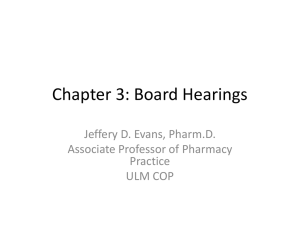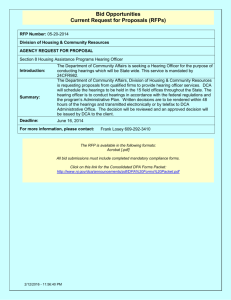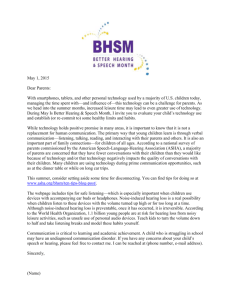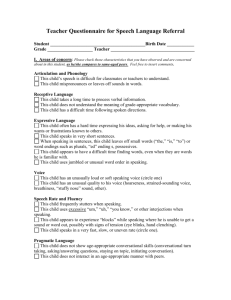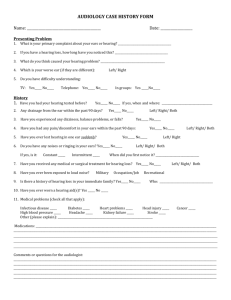Hearings - The Ontario Municipal Board
advertisement
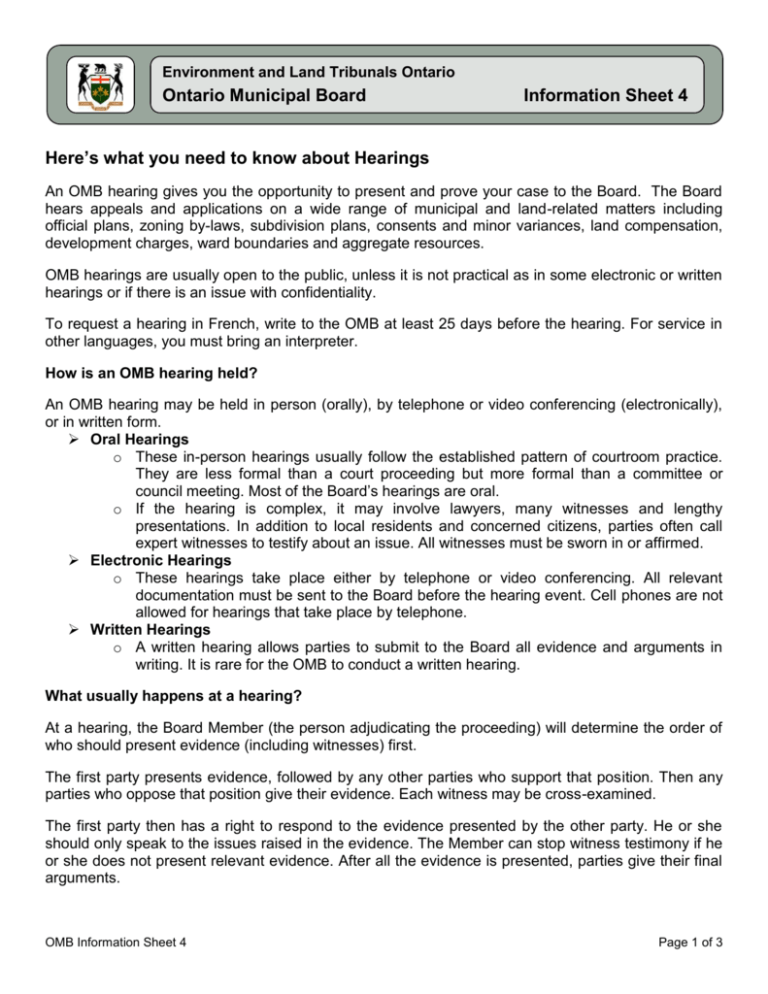
Environment and Land Tribunals Ontario Ontario Municipal Board Information Sheet 4 Here’s what you need to know about Hearings An OMB hearing gives you the opportunity to present and prove your case to the Board. The Board hears appeals and applications on a wide range of municipal and land-related matters including official plans, zoning by-laws, subdivision plans, consents and minor variances, land compensation, development charges, ward boundaries and aggregate resources. OMB hearings are usually open to the public, unless it is not practical as in some electronic or written hearings or if there is an issue with confidentiality. To request a hearing in French, write to the OMB at least 25 days before the hearing. For service in other languages, you must bring an interpreter. How is an OMB hearing held? An OMB hearing may be held in person (orally), by telephone or video conferencing (electronically), or in written form. Oral Hearings o These in-person hearings usually follow the established pattern of courtroom practice. They are less formal than a court proceeding but more formal than a committee or council meeting. Most of the Board’s hearings are oral. o If the hearing is complex, it may involve lawyers, many witnesses and lengthy presentations. In addition to local residents and concerned citizens, parties often call expert witnesses to testify about an issue. All witnesses must be sworn in or affirmed. Electronic Hearings o These hearings take place either by telephone or video conferencing. All relevant documentation must be sent to the Board before the hearing event. Cell phones are not allowed for hearings that take place by telephone. Written Hearings o A written hearing allows parties to submit to the Board all evidence and arguments in writing. It is rare for the OMB to conduct a written hearing. What usually happens at a hearing? At a hearing, the Board Member (the person adjudicating the proceeding) will determine the order of who should present evidence (including witnesses) first. The first party presents evidence, followed by any other parties who support that position. Then any parties who oppose that position give their evidence. Each witness may be cross-examined. The first party then has a right to respond to the evidence presented by the other party. He or she should only speak to the issues raised in the evidence. The Member can stop witness testimony if he or she does not present relevant evidence. After all the evidence is presented, parties give their final arguments. OMB Information Sheet 4 Page 1 of 3 Do I need representation at the hearing? You usually do not need to have representation to appear at the Board. You may represent yourself. If you decide to hire a planner, architect or other professional to represent you, you need to ensure that the person is licensed as a representative though the Law Society of Upper Canada (LSUC) or they may not be able to represent you at the hearing. Different rules of representation may apply if you have a friend or relative represent you. Check the LSUC website for more information about representation. Please note: a Member may rule that you or your planner or architect cannot both give evidence and act as your representative or “advocate.” Will a decision be made at the hearing? The Member may give a decision at the end of a hearing or in writing at a later date (a reserved decision). The decision comes into effect only when the OMB issues its written decision and order. When the decision is issued, it will be sent to all the parties and posted on the OMB website. How do I prepare for my hearing? The Board makes its decisions based on evidence presented at the hearing and relevant laws. To prepare for your hearing you first you should be aware of what the Board does and its processes. It is important to check the appropriate provincial legislation, such as the sections of the Planning Act, which relate to your appeal. You may also want to read related provincial plans, municipal documents, such as by-laws or official plans, the OMB’s Rules of Practice and Procedure and review the OMB website to help you prepare. You also need to prepare evidence for the hearing. Evidence can be anything you think will help support your case. Some examples of evidence include: your testimony photos documents witnesses testimony documents from witnesses Make sure that you provide copies of your documents that you are going to use as evidence to all parties before the hearing. You should also bring copies of your documents to the hearing so that the Board can keep a copy of your evidence on file. You will be asked to speak to the Board. When you first speak to the Board in your opening arguments, you should tell the Board what you want it to do, i.e. what decision you would like it to make and the evidence you will show to support that decision. Usually, the person who filed the OMB Information Sheet 4 Page 2 of 3 application will speak first, and then the persons in support will speak, followed by the persons against the applications. The Board then hears the evidence from the parties and participants. At the end of the hearing, you will make a closing argument that reminds the Board what decision you would like it to make then summarize why the Board should agree with your position. It would be a good idea at that point to mention your own evidence and that of the other parties. Submissions are not evidence. Members may put time limits on your opening and closing arguments so be prepared to be clear and concise when addressing the Member so that you can accomplish what you need to in the time allowed. Where can I get more information? For more information on hearings, refer to the OMB’s Rules of Practice and Procedure (Rules 83-93). The Rules are available at www.omb.gov.on.ca, or by calling (416) 212-6349 or toll free 1-866-4482248. We are committed to providing services as set out in the Accessibility for Ontarians with Disabilities Act, 2005. If you have any accessibility needs, please contact our Accessibility Coordinator as soon as possible. Please Note The information contained in this information sheet is not intended as a substitute for legal or other advice, and in providing this information, the Ontario Municipal Board (OMB) assumes no responsibility for any errors or omissions in this information sheet, and shall not be liable for any reliance placed on the information in this information sheet. Additional information, including the OMB’s Rules of Practice and Procedure, is available at www.omb.gov.on.ca, or by calling (416) 2126349 or toll free 1-866-448-2248. The Environment and Land Tribunals Ontario (ELTO) includes the Assessment Review Board, Board of Negotiation, Conservation Review Board, Environmental Review Tribunal, Ontario Municipal Board, Niagara Escarpment Hearing Office and the Office of Consolidated Hearings. The Tribunals operate under specific legislative requirements and share resources and best practices. The Ontario Municipal Board hears appeals and applications on a wide range of municipal and land-related matters including official plans, zoning by-laws, subdivision plans, consents and minor variances, land compensation, development charges, ward boundaries, and aggregate resources. For more information contact us at: Environment and Land Tribunals Ontario 655 Bay Street, Suite 1500, Toronto, ON M5G 1E5 Telephone: (416) 212-6349 or toll free: 1-866-448-2248 Website: www.elto.gov.on.ca ISBN 978-1-4435-3451-2 / © Queen’s printer for Ontario, 2012 OMB Information Sheet 4 Disponible en français: Voici que vous devez savoir au sujet des audiences Page 3 of 3


